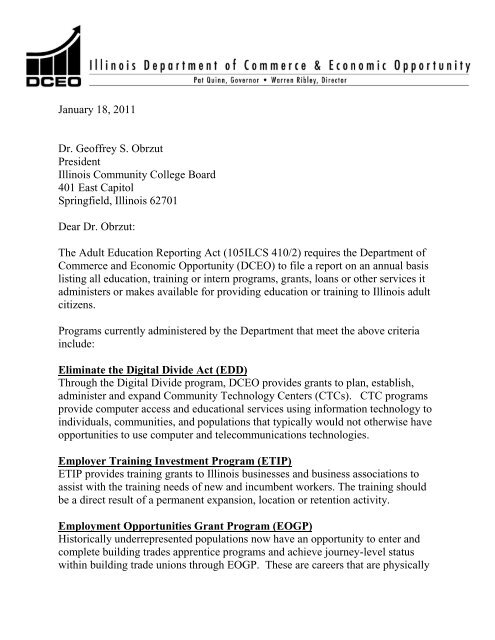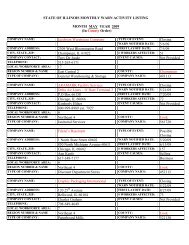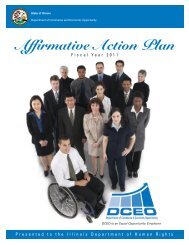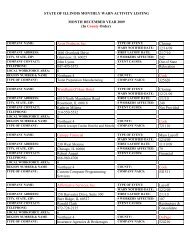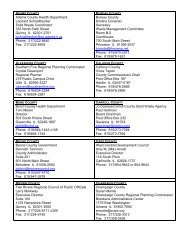January 18, 2011 Dr. Geoffrey S. Obrzut President Illinois ...
January 18, 2011 Dr. Geoffrey S. Obrzut President Illinois ...
January 18, 2011 Dr. Geoffrey S. Obrzut President Illinois ...
Create successful ePaper yourself
Turn your PDF publications into a flip-book with our unique Google optimized e-Paper software.
<strong>January</strong> <strong>18</strong>, <strong>2011</strong><br />
<strong>Dr</strong>. <strong>Geoffrey</strong> S. <strong>Obrzut</strong><br />
<strong>President</strong><br />
<strong>Illinois</strong> Community College Board<br />
401 East Capitol<br />
Springfield, <strong>Illinois</strong> 62701<br />
Dear <strong>Dr</strong>. <strong>Obrzut</strong>:<br />
The Adult Education Reporting Act (105ILCS 410/2) requires the Department of<br />
Commerce and Economic Opportunity (DCEO) to file a report on an annual basis<br />
listing all education, training or intern programs, grants, loans or other services it<br />
administers or makes available for providing education or training to <strong>Illinois</strong> adult<br />
citizens.<br />
Programs currently administered by the Department that meet the above criteria<br />
include:<br />
Eliminate the Digital Divide Act (EDD)<br />
Through the Digital Divide program, DCEO provides grants to plan, establish,<br />
administer and expand Community Technology Centers (CTCs). CTC programs<br />
provide computer access and educational services using information technology to<br />
individuals, communities, and populations that typically would not otherwise have<br />
opportunities to use computer and telecommunications technologies.<br />
Employer Training Investment Program (ETIP)<br />
ETIP provides training grants to <strong>Illinois</strong> businesses and business associations to<br />
assist with the training needs of new and incumbent workers. The training should<br />
be a direct result of a permanent expansion, location or retention activity.<br />
Employment Opportunities Grant Program (EOGP)<br />
Historically underrepresented populations now have an opportunity to enter and<br />
complete building trades apprentice programs and achieve journey-level status<br />
within building trade unions through EOGP. These are careers that are physically
P a g e | 2<br />
and mentally demanding, but which offer wages and benefits on which a family<br />
can be supported.<br />
Incumbent worker Training Program<br />
The Incumbent Worker Training Program was developed to provide a full<br />
continuum of training services that address the needs of the existing workforce, the<br />
unemployed and new entrants to the labor force. It was created to encourage local<br />
business to participate in sector based approaches by encouraging the strong<br />
public-private partnerships to improve the needs of the workforce. LWIBs are<br />
allowed to divert up to 10% of their dislocated worker local allocations to support<br />
Incumbent Worker Training Programs that are part of a layoff aversion strategy.<br />
Job Training and Economic Development Program (JTED)<br />
JTED programs create partnerships between community-based providers and<br />
employers in order to provide customized training to low-skilled, low-wage<br />
employees and unemployed disadvantaged persons.<br />
Sector Based Initiatives<br />
Built on the Critical Skills Shortages Initiative, this program aligns regional<br />
workforce programs to provide a reliable supply of qualified job seekers for<br />
occupations identified as in demand. This strategy was designed to help achieve<br />
the desired linkage between workforce programs and economic development.<br />
Local Workforce Investment Boards (LWIBs) will provide the important<br />
leadership to make this initiative a success.<br />
Trade Adjustment Assistance (TAA)<br />
This program was established to assist workers who became unemployed (or<br />
whose hours of work and wages are reduced) as a result of increased imports from,<br />
or shifts of production to, a foreign country. To facilitate this goal, TAA offers a<br />
variety of benefits for training i.e. income support, job retraining, relocation<br />
allowances, and out-of-area job search allowances.<br />
Training for Tomorrow<br />
A part of Governor Quinn’s Neighborhood Recovery Initiative, Training for<br />
Tomorrow promotes workforce revitalization through providing employment and<br />
training opportunities that meet the specific skill needs of local employers and<br />
residents in targeted communities of the Chicago Area. The program provides<br />
funding to train and place individuals in jobs with local industries experiencing<br />
difficulty in recruiting skilled, entry level workers. Individuals placed are low
P a g e | 3<br />
income, face multiple barriers to employment and/or are recipients of public<br />
assistance or Temporary Assistance for Needy Families (TANF).<br />
.<br />
Workforce Investment Act (WIA)<br />
WIA combines federally-funded job training programs in <strong>Illinois</strong> into a "workforce<br />
development" system where individuals can find a job or train for a new career.<br />
Services are provided through the state's <strong>Illinois</strong> workNet® system. Individuals,<br />
who wish to apply for available training programs or obtain other services, may<br />
report to one of the <strong>Illinois</strong> workNet Centers for assistance or access services<br />
through the <strong>Illinois</strong> workNet portal. The 26 LWIAs, under the guidance of a local<br />
workforce investment board (LWIB), develop employment services and training<br />
programs that reflect the needs and opportunities of the area.<br />
Sincerely,<br />
Therese McMahon<br />
Deputy Director<br />
Bureau of Workforce Development<br />
TM/sg


